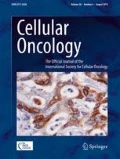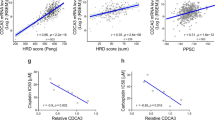Abstract
Background
Squamous cell lung cancer (SqCLC) is a distinct histologic subtype of non-small cell lung cancer (NSCLC). Although the discovery of driver mutations and their targeted drugs has remarkably improved the treatment outcomes for lung adenocarcinoma, currently no such molecular target is clinically available for SqCLC. The CDKN2A locus at 9p21 encodes two alternatively spliced proteins, p16INK4a (p16) and p14ARF (p14), which function as cell cycle inhibitors. The Cancer Genome Atlas (TCGA) project revealed that CDKN2A is inactivated in 72% of SqCLC cases. In addition, it was found that CDKN2A mutations are significantly more common in SqCLC than in adenocarcinoma. Down-regulation of p16 and p14 by CDKN2A gene inactivation leads to activation of cyclin-dependent kinases (CDKs), thereby permitting constitutive phosphorylation of Rb and subsequent cell cycle progression. Here, we hypothesized that CDK inhibition may serve as an attractive strategy for the treatment of CDKN2A-defective SqCLC.
Methods
We investigated whether the CDK inhibitors flavopiridol and dinaciclib may exhibit antitumor activity in CDKN2A-defective SqCLC cells compared to control cells. The cytotoxic effect of the CDK inhibitors was evaluated using cell viability assays, and the induction of apoptosis was assessed using TUNEL assays and Western blot analyses. Finally, anti-tumor effects of the CDK inhibitors on xenografted cells were investigated in vivo.
Results
We found that flavopiridol and dinaciclib induced cytotoxicity by enhancing apoptosis in CDKN2A-defective SqCLC cells, and that epithelial to mesenchymal transition (EMT) decreased and autophagy increased during this process. In addition, we found that autophagy had a cytoprotective role.
Conclusion
Our data suggest a potential role of CDK inhibitors in managing CDKN2A-defective SqCLC.








Similar content being viewed by others
References
W.D. Travis, Pathology of lung cancer. Clin. Chest Med. 32, 669–692 (2011)
C.J. Langer, C. Obasaju, P. Bunn, P. Bonomi, D. Gandara, F.R. Hirsch, E.S. Kim, R.B. Natale, S. Novello, L. Paz-Ares, M. Perol, M. Reck, S.S. Ramalingam, C.H. Reynolds, M.A. Socinski, D.R. Spigel, H. Wakelee, C. Mayo, N. Thatcher, Incremental innovation and progress in advanced squamous cell lung cancer: Current status and future impact of treatment. J. Thorac. Oncol. 11, 2066–2081 (2016)
M.A. Socinski, C. Obasaju, D. Gandara, F.R. Hirsch, P. Bonomi, P.A. Bunn Jr., E.S. Kim, C.J. Langer, R.B. Natale, S. Novello, L. Paz-Ares, M. Perol, M. Reck, S.S. Ramalingam, C.H. Reynolds, D.R. Spigel, H. Wakelee, N. Thatcher, Current and emergent therapy options for advanced squamous cell lung cancer. J. Thorac. Oncol. 13, 165–183 (2018)
F.R. Hirsch, G.V. Scagliotti, J.L. Mulshine, R. Kwon, W.J. Curran, Jr., Y.L. Wu, L. Paz-Ares, Lung cancer: Current therapies and new targeted treatments. Lancet 389, 299–311 (2017)
M. Reck, K.F. Rabe, Precision diagnosis and treatment for advanced non-small-cell lung cancer. N. Engl. J. Med. 377, 849–861 (2017)
A. Thomas, S.V. Liu, D.S. Subramaniam, G. Giaccone, Refining the treatment of NSCLC according to histological and molecular subtypes. Nat. Rev. Clin. Oncol. 12, 511–526 (2015)
M. Ruas, G. Peters, The p16INK4a/CDKN2A tumor suppressor and its relatives. Biochim. Biophys. Acta 1378, F115–F177 (1998)
N.E. Sharpless, INK4a/ARF: A multifunctional tumor suppressor locus. Mutat. Res. 576, 22–38 (2005)
A. Pacifico, G. Leone, Role of p53 and CDKN2A inactivation in human squamous cell carcinomas. J. Biomed. Biotechnol. 2007, 43418 (2007)
R. Zhao, B.Y. Choi, M.H. Lee, A.M. Bode, Z. Dong, Implications of genetic and epigenetic alterations of CDKN2A (p16(INK4a)) in cancer. EBioMedicine 8, 30–39 (2016)
F.J. Stott, S. Bates, M.C. James, B.B. McConnell, M. Starborg, S. Brookes, I. Palmero, K. Ryan, E. Hara, K.H. Vousden, G. Peters, The alternative product from the human CDKN2A locus, p14(ARF), participates in a regulatory feedback loop with p53 and MDM2. EMBO J. 17, 5001–5014 (1998)
M. Serrano, H. Lee, L. Chin, C. Cordon-Cardo, D. Beach, R.A. DePinho, Role of the INK4a locus in tumor suppression and cell mortality. Cell 85, 27–37 (1996)
Cancer Genome Atlas Research Network, Comprehensive genomic characterization of squamous cell lung cancers. Nature 489, 519–525 (2012)
Cancer Genome Atlas Research Network, Comprehensive molecular profiling of lung adenocarcinoma. Nature 511, 543–550 (2014)
G.I. Shapiro, Cyclin-dependent kinase pathways as targets for cancer treatment. J. Clin. Oncol. 24, 1770–1783 (2006)
T. VanArsdale, C. Boshoff, K.T. Arndt, R.T. Abraham, Molecular pathways: Targeting the cyclin D-CDK4/6 axis for cancer treatment. Clin. Cancer Res. 21, 2905–2910 (2015)
D. Parry, T. Guzi, F. Shanahan, N. Davis, D. Prabhavalkar, D. Wiswell, W. Seghezzi, K. Paruch, M.P. Dwyer, R. Doll, A. Nomeir, W. Windsor, T. Fischmann, Y. Wang, M. Oft, T. Chen, P. Kirschmeier, E.M. Lees, Dinaciclib (SCH 727965), a novel and potent cyclin-dependent kinase inhibitor. Mol. Cancer Ther. 9, 2344–2353 (2010)
M.M. Al-Ansari, S.F. Hendrayani, A. Tulbah, T. Al-Tweigeri, A.I. Shehata, A. Aboussekhra, p16INK4A represses breast stromal fibroblasts migration/invasion and their VEGF-a-dependent promotion of angiogenesis through Akt inhibition. Neoplasia 14, 1269–1277 (2012)
M.M. Al-Ansari, S.F. Hendrayani, A.I. Shehata, A. Aboussekhra, p16(INK4A) represses the paracrine tumor-promoting effects of breast stromal fibroblasts. Oncogene 32, 2356–2364 (2013)
C. Umbreit, J. Flanjak, C. Weiss, P. Erben, C. Aderhold, A. Faber, J. Stern-Straeter, K. Hoermann, J.D. Schultz, Incomplete epithelial-mesenchymal transition in p16-positive squamous cell carcinoma cells correlates with beta-catenin expression. Anticancer Res. 34, 7061–7069 (2014)
A. Scott, F. Bai, H.L. Chan, S. Liu, J. Ma, J.M. Slingerland, D.J. Robbins, A.J. Capobianco, X.H. Pei, p16INK4a suppresses BRCA1-deficient mammary tumorigenesis. Oncotarget 7, 84496–84507 (2016)
H.H. Al-Khalaf, A. Aboussekhra, p16(INK4A) induces senescence and inhibits EMT through microRNA-141/microRNA-146b-5p-dependent repression of AUF1. Mol. Carcinog. 56, 985–999 (2017)
S. Lamouille, J. Xu, R. Derynck, Molecular mechanisms of epithelial-mesenchymal transition. Nat. Rev. Mol. Cell Biol. 15, 178–196 (2014)
D.J. Klionsky, S.D. Emr, Autophagy as a regulated pathway of cellular degradation. Science 290, 1717–1721 (2000)
B. Levine, Cell biology: Autophagy and cancer. Nature 446, 745–747 (2007)
J. Pimkina, O. Humbey, J.T. Zilfou, M. Jarnik, M.E. Murphy, ARF induces autophagy by virtue of interaction with Bcl-xl. J. Biol. Chem. 284, 2803–2810 (2009)
H. Jiang, V. Martin, C. Gomez-Manzano, D.G. Johnson, M. Alonso, E. White, J. Xu, T.J. McDonnell, N. Shinojima, J. Fueyo, The RB-E2F1 pathway regulates autophagy. Cancer Res. 70, 7882–7893 (2010)
C. Capparelli, B. Chiavarina, D. Whitaker-Menezes, T.G. Pestell, R.G. Pestell, J. Hulit, S. Ando, A. Howell, U.E. Martinez-Outschoorn, F. Sotgia, M.P. Lisanti, CDK inhibitors (p16/p19/p21) induce senescence and autophagy in cancer-associated fibroblasts, "fueling" tumor growth via paracrine interactions, without an increase in neo-angiogenesis. Cell Cycle 11, 3599–3610 (2012)
N. Mizushima, T. Yoshimori, B. Levine, Methods in mammalian autophagy research. Cell 140, 313–326 (2010)
G. Das, B.V. Shravage, E.H. Baehrecke, Regulation and function of autophagy during cell survival and cell death. Cold Spring Harb. Perspect. Biol. 4 (2012)
D.A. Gewirtz, The four faces of autophagy: Implications for cancer therapy. Cancer Res. 74, 647–651 (2014)
M. Yousefi, T. Bahrami, A. Salmaninejad, R. Nosrati, P. Ghaffari, S.H. Ghaffari, Lung cancer-associated brain metastasis: Molecular mechanisms and therapeutic options. Cell. Oncol. 40, 419–441 (2017)
D.R. Gandara, P.S. Hammerman, M.L. Sos, P.N. Lara Jr., F.R. Hirsch, Squamous cell lung cancer: From tumor genomics to cancer therapeutics. Clin. Cancer Res. 21, 2236–2243 (2015)
Z. Lou-Qian, Y. Rong, L. Ming, Y. Xin, J. Feng, X. Lin, The prognostic value of epigenetic silencing of p16 gene in NSCLC patients: A systematic review and meta-analysis. PLoS One 8, e54970 (2013)
X.B. Xing, W.B. Cai, L. Luo, L.S. Liu, H.J. Shi, M.H. Chen, The prognostic value of p16 hypermethylation in cancer: A meta-analysis. PLoS One 8, e66587 (2013)
M. Malumbres, M. Barbacid, To cycle or not to cycle: A critical decision in cancer. Nat. Rev. Cancer 1, 222–231 (2001)
M. Malumbres, M. Barbacid, Cell cycle, CDKs and cancer: A changing paradigm. Nat. Rev. Cancer 9, 153–166 (2009)
C. Criscitiello, G. Viale, A. Esposito, G. Curigliano, Dinaciclib for the treatment of breast cancer. Expert Opin. Investig. Drugs 23, 1305–1312 (2014)
J. Flynn, J. Jones, A.J. Johnson, L. Andritsos, K. Maddocks, S. Jaglowski, J. Hessler, M.R. Grever, E. Im, H. Zhou, Y. Zhu, D. Zhang, K. Small, R. Bannerji, J.C. Byrd, Dinaciclib is a novel cyclin-dependent kinase inhibitor with significant clinical activity in relapsed and refractory chronic lymphocytic leukemia. Leukemia 29, 1524–1529 (2015)
C. Abdullah, X. Wang, D. Becker, Expression analysis and molecular targeting of cyclin-dependent kinases in advanced melanoma. Cell Cycle 10, 977–988 (2011)
C. Hu, T. Dadon, V. Chenna, S. Yabuuchi, R. Bannerji, R. Booher, P. Strack, N. Azad, B.D. Nelkin, A. Maitra, Combined inhibition of cyclin-dependent kinases (dinaciclib) and AKT (MK-2206) blocks pancreatic tumor growth and metastases in patient-derived xenograft models. Mol. Cancer Ther. 14, 1532–1539 (2015)
A. Stone, R.L. Sutherland, E.A. Musgrove, Inhibitors of cell cycle kinases: Recent advances and future prospects as cancer therapeutics. Crit. Rev. Oncog. 17, 175–198 (2012)
P.J. Roberts, J.E. Bisi, J.C. Strum, A.J. Combest, D.B. Darr, J.E. Usary, W.C. Zamboni, K.K. Wong, C.M. Perou, N.E. Sharpless, Multiple roles of cyclin-dependent kinase 4/6 inhibitors in cancer therapy. J. Natl. Cancer Inst. 104, 476–487 (2012)
Acknowledgements
This study was supported by a grant from the Korea Institute of Radiological and Medical Sciences (KIRAMS), funded by Ministry of Science and ICT (MSIT), Republic of Korea (50474-2018).
Author information
Authors and Affiliations
Corresponding author
Ethics declarations
Conflict of interest
The authors declare that they have no conflict of interest.
Rights and permissions
About this article
Cite this article
Jeong, EH., Lee, TG., Ko, Y.J. et al. Anti-tumor effect of CDK inhibitors on CDKN2A-defective squamous cell lung cancer cells. Cell Oncol. 41, 663–675 (2018). https://doi.org/10.1007/s13402-018-0404-6
Accepted:
Published:
Issue Date:
DOI: https://doi.org/10.1007/s13402-018-0404-6




